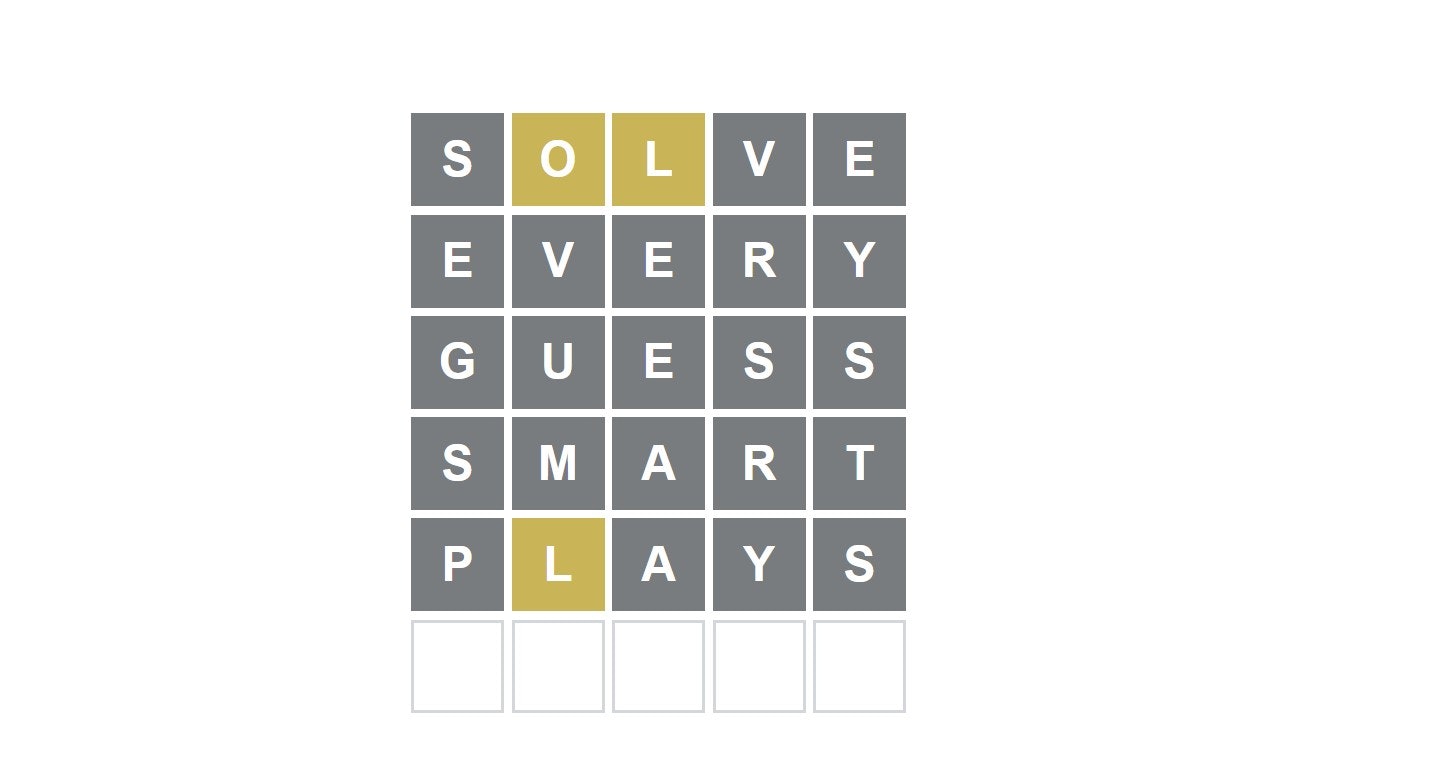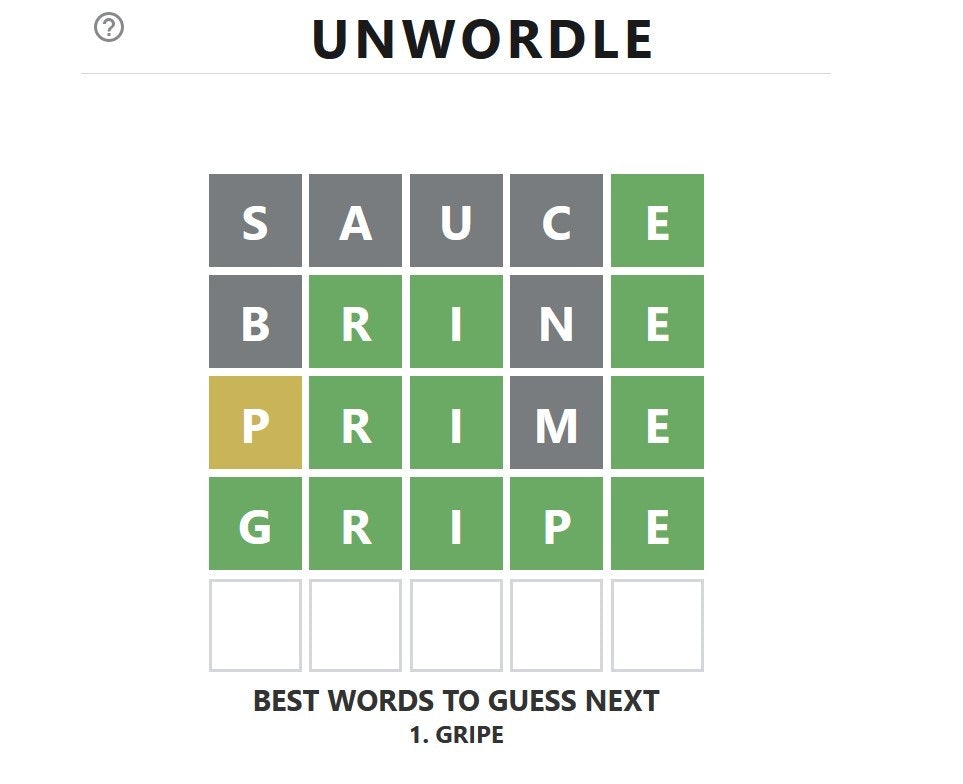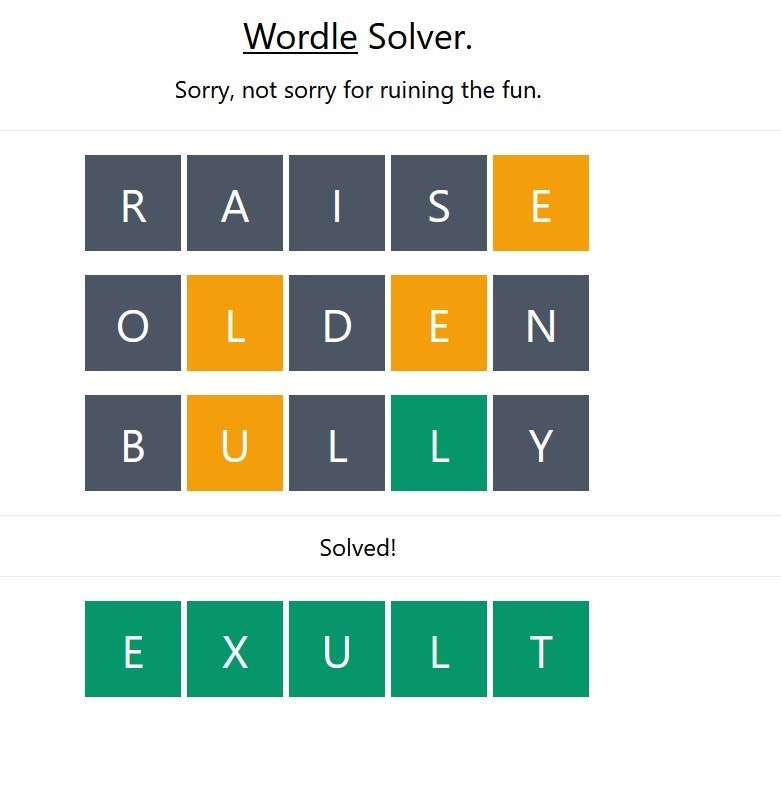
Wordle is taking the world by storm, with master and amateur wordsmiths doing their best to guess developer Josh Wardle’s daily magic word. That being said, while the vast majority of players prefer to enjoy the free web-based game as is, the app has prompted plenty of intrigue from those in scientific communities. Is it possible for an algorithm to determine the absolute best starter word for any situation? Which single five-letter word is capable of offering the best chance for a single-guess victory?
These are the questions some of the brightest minds are currently trying to figure out. And, as you might’ve guessed, the answers to those quagmires remain fairly complex. Perhaps unsurprisingly, homemade Wordle algorithms are a dime a dozen these days, and each one seems to spit out a slightly different answer than the next. However, when combined, they reveal some common tips that might improve your guessing accuracy without resorting to search engines for the precise solution.
Best Wordle starting words: The Tyler Glaiel Algorithm
Our first example exploring the science of Wordle arrives via a Medium blog post from programmer and game designer Tyler Glaiel. Glaiel has made an algorithm to dissect Wordle’s known list of 2,315 possible answers and 12,972 potential guesses by assigning each word with a hypothetical score. Desirable green letters are worth two points, and less certain yellow letters are worth one point. The useless gray squares, of course, are listed with a value of zero.
In studying the work he’d done, here’s what Glaiel discovered.
- SOARE: This word, which is used to describe a young hawk, is the word that returned the highest score of all potential guesses. However, it was often not fast enough at getting players to a solution, sometimes taking as many as eight guesses to reach its inevitable conclusion.
- ROATE: This word, which is most often leveraged as a financial term, was able to get to solutions the fastest. It was capable of finding the solution in a maximum of five guesses, meaning it always led to the correct solution. Of course, there are lots of variables to the process which means a human won’t always guess the daily Wordle by starting here, but it’s still an effective starter word.
- RAISE: This very ordinary term is the one that Glaiel’s algorithm found to be the single best outlet for potentially getting the correct Wordle in a single guess.
Best Wordle starting words: The Mahmood Hikmet Algorithm:
Hikmet’s algorithm strives to solve the same problems as Glaiel’s, but it does so via different means. Instead of scoring potential guesses based on their overall accuracy, this algorithm works by deducing the frequency by which certain letters appear in the list of solutions and ignoring the potential guesses. Simply put, the words that use the most popular letters in the solutions are deemed the best starter words to guess.

Here are some of Hikmet’s best starter words according to his Unwordle tool designed to help you solve Wordle puzzles with a 99.3% success rate. It uses the exact same strategy of only examining the list of answers to figure out the best possible starting guesses. These starting words are listed in order of their effectiveness.
- SLATE
- SAUCE
- SLICE
- SHALE
- SAUTE
- SHARE
- SOOTY
- SHINE
- SUITE
- CRANE
Best Wordle starting words: The Andrew Taylor Algorithm
The algorithm described in Andrew Taylor’s “How to Always Win at Wordle” video sounds like a combination of the prior two philosophies. It offers a numerical score to each of the potential solutions, with the lowest score signifying the best solutions worth guessing. Here’s what Taylor’s script was able to uncover.
- REAIS: This was deemed Taylor’s very best starting word, with only 168 potential solutions having none of those letters in it.
- BLAHS: This was noted to be Taylor’s best word for eliminating the most answers.
- CENTU: This was Taylor’s word that was second most effective at eliminating words.
- DOGGO: Taylor’s third-best word at eliminating potential answers.
The Tom Neil Algorithm: Tom Neil is the creator of the popular Wordle Solver tool, and his algorithm is based entirely on the idea of answer elimination. Rather than working from a strategy of starting with words that use lots of vowels, for example, Neil feels that it’s actually more advantageous to start your first two guesses in Wordle by using words with 10 completely unique letters. Through this philosophy, one eliminates the most potential solutions the fastest.

- RAISE: Just like Glaiel, Neil also determined RAISE was the most effective guess with regard to elimination. By just starting there, players can reportedly eliminate 98% percent of the potential answers at the very first step.
- While other algorithms may take you down paths of shared letters, this one will sometimes have you jumping between vastly different words. The method, however, is all about eliminating as many answers as you possibly can.
Best Wordle starting words: The Loren Shure Method:
Rather than digging into the code and peering at the game’s list of potential answers, Loren Shure published a blog post on MathWorks that describes Wordle strategies with less cheating involved. Using a stock dictionary of five-letter words, Shure simply made a list of the most commonly used letters and scored five-letter words based on how often the word featured those letters. Here are the best first guesses that this particular scientist worked from.
- AROSE
- EARLS
- LASER
- REALS
- ALOES
In subsequent guesses, Shure takes a cue from the likes of Neil by focusing on words with disparate letter combinations until the field is narrowed down far enough to start honing your attempts.
Three scientific tips to solving every single Wordle
Just like many scientific endeavors, the process of solving Wordle is oftentimes far from precise. However, if we boil down the strategies leveraged in these four examples, there are some tips that may be worth considering as you work through your daily games.
- Use lots of vowels: The commonplace knowledge of using lots of vowels holds up to scientific testing as a means of eliminating lots of potential solutions.
- Don’t be afraid to use guesses that look different: Even though your final chart may not look very pretty with lots of green squares, sometimes starting off your first two guesses with 10 entirely unique letters is a very worthwhile strategy.
- Use “normal” language: Even though Taylor’s list, in particular, gets a bit obscure in terms of its vocabulary, many of the effective words used in the other three examples are found in everyday speech. Wordle’s dictionary was crafted by a human, so don’t get too caught up using uncommon words.
Even some of these polished algorithms can’t solve every single Wordle, but there’s an obvious scientific solution to Josh Wardle’s simple game.







